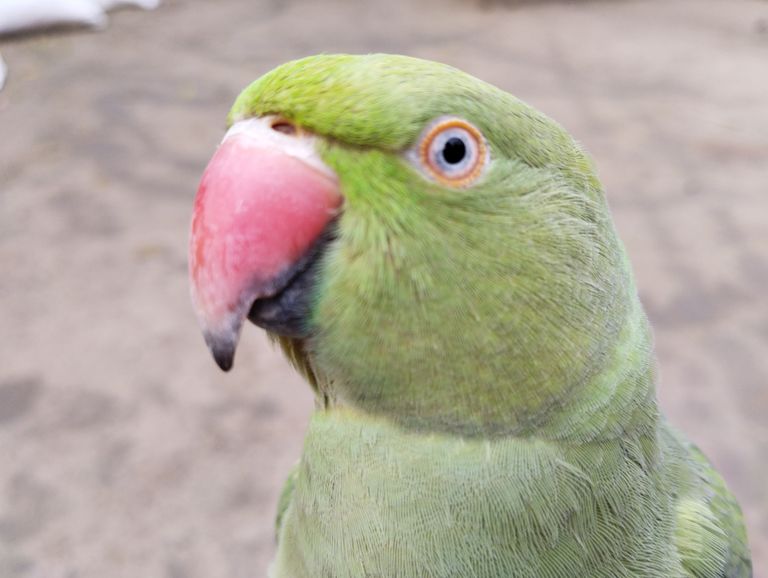
How to Take Care of a Pet Parrot A Complete Guide.
Parrots, especially Indian Ringneck Parakeets (Tiya Pakhi), are intelligent, social, and affectionate birds. They require proper care, a healthy diet, and a stimulating environment to thrive. If you are planning to keep a parrot as a pet, this guide will help you understand how to take care of them properly.
- Choosing the Right Parrot
Before bringing a parrot home, consider these factors:
Species: Some common pet parrots include Indian Ringneck Parrots, Budgies, Lovebirds, African Greys, and Macaws.
Lifespan: Parrots can live from 10 to 80 years, depending on the species.
Talking Ability: Indian Ringneck Parrots are excellent talkers, but some parrots may not learn to mimic words.
Time Commitment: Parrots need daily attention, social interaction, and mental stimulation.
- Setting Up a Comfortable Cage
A parrot’s cage is its home, so it must be safe, spacious, and comfortable.
Cage Size & Placement
Choose a large cage so your parrot can stretch its wings and move around freely.
Place the cage in a quiet yet social area of your house, avoiding direct sunlight, drafts, and kitchen fumes.
The bar spacing should be appropriate for the size of the parrot to prevent injuries.
Cage Accessories
Perches: Use natural wooden perches of varying thickness to promote foot health.
Food & Water Bowls: Use stainless steel bowls for hygiene and easy cleaning.
Toys: Provide chewable toys, bells, and puzzles to keep your parrot mentally stimulated.
Hiding Spots: A small cloth tent or corner hideout can help your parrot feel secure.
- Proper Diet and Nutrition
A balanced diet is essential for a healthy and happy parrot.
What to Feed
Fresh Fruits & Vegetables: Apples, carrots, spinach, mangoes, bananas, and leafy greens.
Pellets: High-quality bird pellets should be a staple in their diet.
Seeds & Nuts: Offer in moderation; excessive seeds can lead to obesity.
Boiled Eggs & Cooked Rice: Occasionally provide these for protein and variety.
What to Avoid
Chocolate, caffeine, and alcohol (toxic for birds).
Avocado, onions, and garlic (harmful to parrots).
Junk food and salty snacks (can cause health issues).
- Training and Socialization
Parrots are intelligent birds and need social interaction and training.
Taming Your Parrot
Start by spending time near the cage and talking softly.
Offer treats from your hand to build trust.
Gradually train the parrot to step onto your hand or a perch.
Teaching to Talk & Tricks
Repeat words and phrases daily in a cheerful tone.
Reward the parrot when it mimics words correctly.
Use positive reinforcement to teach tricks like waving, spinning, or retrieving objects.
- Maintaining Hygiene & Health
Cleaning the Cage
Daily: Change food and water, remove uneaten food.
Weekly: Clean perches, bowls, and toys.
Monthly: Deep clean the entire cage with a bird-safe disinfectant.
Grooming
Bathing: Allow your parrot to bathe in a shallow dish or spray with water.
Beak & Nail Care: Provide cuttlebones and wooden toys to naturally trim the beak and nails.
Common Health Issues
Feather Plucking: Caused by stress, boredom, or illness.
Respiratory Issues: Signs include wheezing and nasal discharge.
Diarrhea: Often due to poor diet or infections.
If your parrot shows signs of illness, consult an avian vet immediately.
- Providing Entertainment & Enrichment
Parrots are intelligent creatures that need constant stimulation.
Interactive Toys
Chew toys, puzzle feeders, and bells.
Rotating different toys weekly to prevent boredom.
Social Interaction
Spend at least 1-2 hours daily interacting with your parrot.
Let them explore outside the cage in a safe, bird-proofed area.
Companion Birds
Some parrots thrive with a companion, but introductions should be gradual.
Monitor their interactions to prevent fights.
- Allowing Flight or Wing Clipping
If you want your parrot to fly, ensure a safe indoor environment free from hazards like ceiling fans and open windows.
Some owners prefer wing clipping to prevent escape, but it should be done by a professional.
- Bonding with Your Parrot
Building a strong bond with your parrot requires patience and consistency.
Talk to them often in a gentle voice.
Offer treats and rewards for good behavior.
Spend quality time playing and interacting with them daily.
Final Thoughts
Parrots are wonderful pets, but they require commitment, care, and love. By providing a proper environment, healthy diet, and daily interaction, you can ensure your parrot lives a long, happy, and fulfilling life. Are you ready to welcome a parrot into your home? Let us know in the comments.
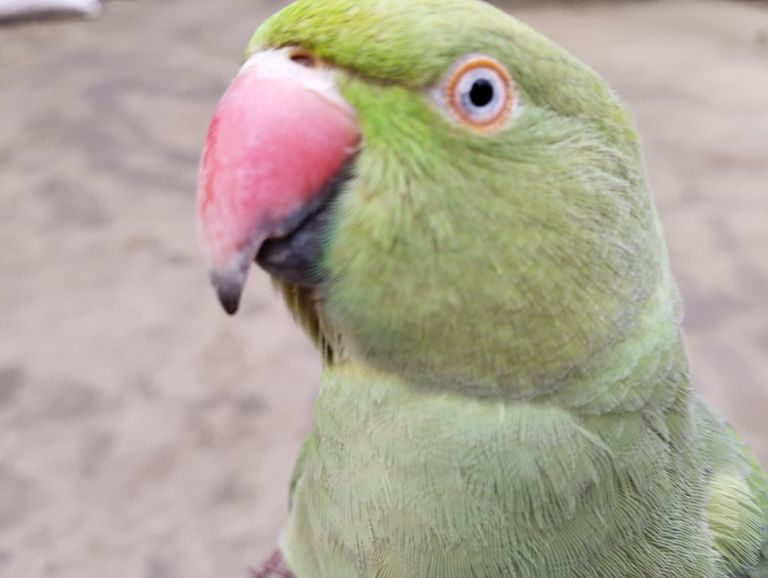
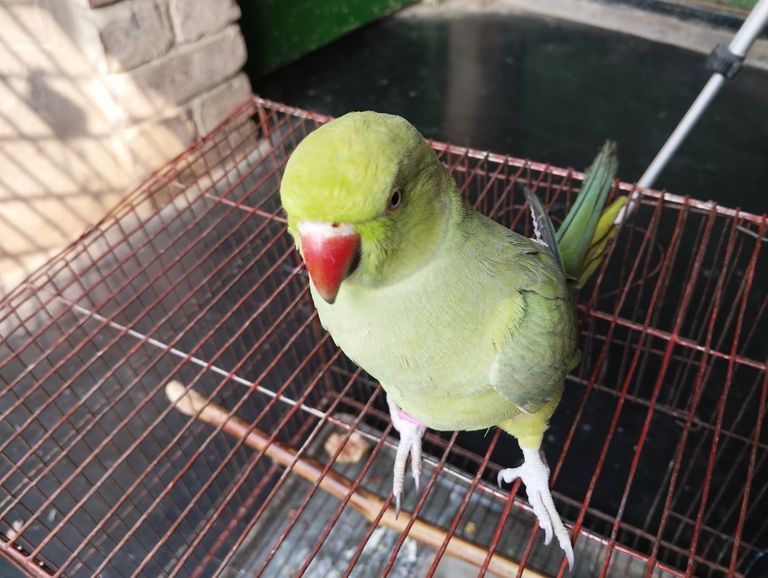
Complete Guide to Tia Parrot Food: Best Diet for a Healthy Bird
Tia parrots (also called ring-necked parrots or parakeets) are intelligent, playful, and social birds that require a balanced and nutritious diet to stay healthy and happy. Providing the right food is crucial for their physical and mental well-being. In this guide, we will cover everything you need to know about feeding a Tia parrot, including the best foods, harmful foods to avoid, and diet tips.
- Understanding a Tia Parrot’s Natural Diet
Tia parrots are omnivorous, meaning they eat both plant-based and small amounts of animal-based food. In the wild, their diet consists of:
Fruits – Mangoes, guavas, bananas, apples, papayas
Seeds – Sunflower seeds, millet, pumpkin seeds
Nuts – Almonds, walnuts, cashews
Vegetables – Leafy greens, carrots, bell peppers
Flowers – Hibiscus, marigold, rose petals
Occasional Insects – Small insects for protein
A pet Tia parrot should have a diet that mimics its natural food as closely as possible.
- Best Foods for a Tia Parrot
A balanced diet for a Tia parrot should include a mix of seeds, fresh fruits, vegetables, nuts, and pellets.
A. Seeds and Grains (25-30% of the Diet)
Seeds are an important part of a Tia parrot's diet, but they should not be the only food. A variety of seeds and grains ensures a good balance of nutrients.
Healthy Seeds: Millet, flaxseeds, chia seeds, pumpkin seeds
Grains: Brown rice, quinoa, barley, whole wheat
Tip: Avoid too many sunflower seeds as they are high in fat and can lead to obesity.
B. Fresh Fruits (20-25% of the Diet)
Fruits provide essential vitamins, antioxidants, and hydration.
Best Fruits for Tia Parrots:
Apple (remove seeds)
Banana
Mango
Papaya
Grapes (in moderation)
Pomegranate
Watermelon (seedless)
Tip: Always wash fruits thoroughly to remove pesticides.
C. Fresh Vegetables (20-25% of the Diet)
Vegetables provide fiber, vitamins, and minerals essential for a Tia parrot’s health.
Best Vegetables:
Carrots
Spinach
Broccoli
Bell peppers
Sweet potatoes
Cucumber
Green beans
Tip: Avoid giving raw onions and garlic as they are harmful.
D. Nuts (5-10% of the Diet)
Nuts are a great source of healthy fats and proteins but should be given in moderation.
Safe Nuts: Almonds, walnuts, cashews, pistachios (unsalted and unroasted)
Tip: Crush nuts into small pieces to prevent choking hazards.
E. Commercial Pellets (15-20% of the Diet)
High-quality pellets provide balanced nutrition and help fill any gaps in the diet. Choose pellets that are free from artificial colors and preservatives.
Tip: Introduce pellets gradually if your parrot is not used to them.
F. Occasional Treats (5% of the Diet)
Tia parrots enjoy occasional treats like boiled eggs (for protein), sprouts, and cooked legumes.
- Foods to Avoid
Some foods are toxic or unhealthy for Tia parrots and should be avoided.
Toxic Foods:
❌ Avocado – Contains persin, which is toxic to birds
❌ Chocolate – Contains theobromine, which is harmful
❌ Caffeine – Found in tea, coffee, and energy drinks
❌ Onions & Garlic – Can cause digestive issues
❌ Alcohol – Extremely toxic to birds
❌ Apple Seeds & Cherry Pits – Contain cyanide
Unhealthy Foods:
❌ Processed Sugary Foods – Cakes, cookies, candy
❌ Salty Foods – Chips, fried foods, junk food
❌ Raw Beans – Some beans contain toxins if not cooked properly
Tip: Always check new foods before feeding them to your parrot.
- Feeding Schedule & Portion Control
A well-planned feeding schedule ensures that your Tia parrot gets a balanced diet without overeating.
Ideal Feeding Schedule:
Morning (Breakfast): Fresh fruits + seeds
Afternoon (Lunch): Vegetables + grains + pellets
Evening (Dinner): Light meal with a mix of nuts, small seeds, and a little fruit
Tip: Always provide fresh, clean water for drinking.
- Tips for a Healthy Diet
Keep it Fresh: Remove uneaten food after a few hours to prevent spoilage.
Mix It Up: Rotate different foods to ensure variety and balance.
Monitor Weight & Health: If your parrot gains or loses weight, adjust the diet accordingly.
Encourage Foraging: Hide food in toys to make mealtime fun and engaging.
- Conclusion
Feeding your Tia parrot a well-balanced diet is essential for its health, energy, and longevity. By providing a variety of seeds, fruits, vegetables, and pellets, you can ensure your bird gets the right nutrients. Avoid toxic foods, maintain a proper feeding schedule, and observe your parrot’s health regularly. By following these guidelines, you’ll have a happy, healthy Tia parrot that thrives for years to come.
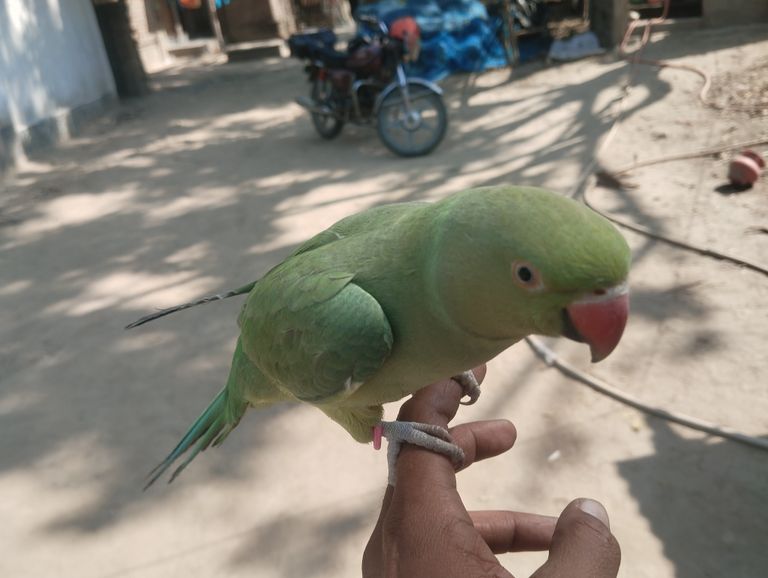
What to Do When Your Parrot Stops Talking: Causes and Solutions
Parrots, especially Indian Ringneck Parakeets and other talking species, are known for their ability to mimic human speech. If your parrot suddenly stops talking after previously being vocal, it can be concerning. This behavior, often referred to as a "vow of silence," can happen for various reasons. In this article, we'll explore why your parrot may have stopped talking and what you can do to encourage it to speak again.
Why Do Parrots Stop Talking?
There are several reasons why your parrot may stop speaking or mimicking words:
- Stress or Fear
Parrots are highly sensitive birds that can easily get stressed due to changes in their environment. Some common causes of stress include:
A new pet or family member
A change in the location of the cage
Loud noises or sudden disturbances
A recent traumatic experience
If your parrot feels threatened, it may choose to stay silent as a survival instinct.
- Illness or Injury
A sick or injured parrot may stop talking as it focuses on recovering. Some signs that your bird might be unwell include:
Fluffed-up feathers
Lethargy or sitting at the bottom of the cage
Loss of appetite
Abnormal droppings
If you suspect your parrot is sick, take it to an avian vet as soon as possible.
- Molting Period
Molting is a natural process where parrots shed old feathers and grow new ones. During this time, they might feel uncomfortable or irritated, leading them to become quieter than usual. This phase is temporary, and once the molting process is over, your bird should return to normal behavior.
- Boredom or Lack of Stimulation
Parrots are intelligent and need mental stimulation to stay engaged. If they become bored, they may stop talking. Make sure your bird has:
Plenty of toys to play with
Social interaction with humans or other birds
Training sessions or activities that challenge their minds
- Change in Routine
Parrots thrive on routine. If their daily schedule changes suddenly—such as feeding times, interaction periods, or playtime—they may become silent as they adjust.
- Aging and Natural Behavior Changes
As parrots grow older, their behavior may change. Some birds talk less with age, while others become quieter due to hormonal shifts.
How to Encourage Your Parrot to Talk Again
If your parrot has stopped talking, don’t panic. There are several ways to encourage it to regain its speech:
- Create a Comfortable and Safe Environment
Make sure your parrot’s cage is in a calm and stable location. Avoid placing it near loud noises or high-traffic areas where it may feel threatened.
- Talk to Your Parrot Regularly
Parrots learn by listening and repeating. Speak to your bird in a calm and friendly tone. Try using familiar phrases that your parrot used to say.
- Play Recorded Words or Songs
If your parrot learned words from a particular sound source, such as TV, radio, or recordings, play those again to trigger its memory.
- Use Positive Reinforcement
Reward your parrot with treats or praise whenever it makes a sound, even if it’s not a word. This encourages vocalization.
- Introduce a Companion (If Suitable)
Some parrots become more vocal when they have another bird to interact with. However, ensure compatibility before introducing a new parrot.
- Be Patient
Forcing your bird to talk can have the opposite effect. Allow your parrot to speak at its own pace and avoid putting pressure on it.
When to See a Vet
If your parrot has stopped talking for an extended period and shows other signs of distress, it’s best to consult a vet. A professional can check for any underlying health issues.
Final Thoughts
Parrots stopping their speech temporarily is usually not a major concern. It’s often a response to stress, changes, or health conditions. By creating a comfortable environment and maintaining positive interactions, you can encourage your parrot to talk again. Be patient, and soon enough, your feathery friend will be back to chatting with you.
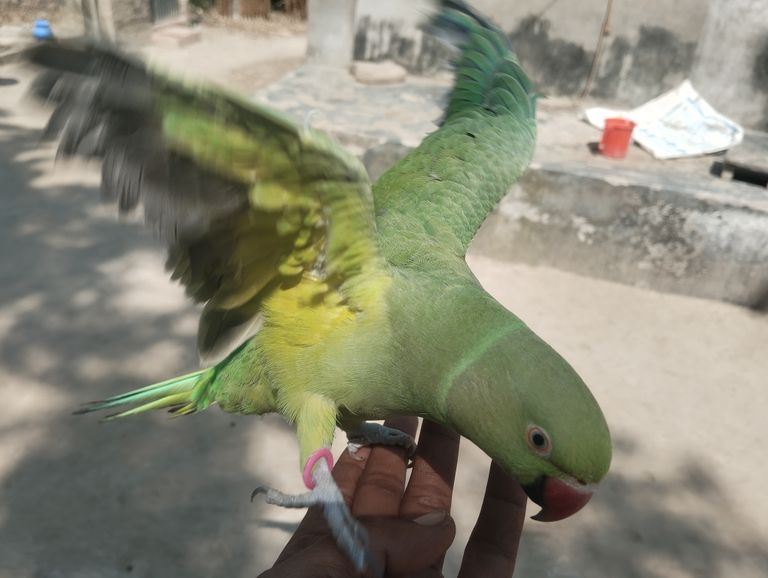
What to Do When Your Parrot Stops Talking: Causes and Solutions
Parrots, especially Indian Ringneck Parakeets and other talking species, are known for their ability to mimic human speech. If your parrot suddenly stops talking after previously being vocal, it can be concerning. This behavior, often referred to as a "vow of silence," can happen for various reasons. In this article, we'll explore why your parrot may have stopped talking and what you can do to encourage it to speak again.
Why Do Parrots Stop Talking?
There are several reasons why your parrot may stop speaking or mimicking words:
- Stress or Fear
Parrots are highly sensitive birds that can easily get stressed due to changes in their environment. Some common causes of stress include:
A new pet or family member
A change in the location of the cage
Loud noises or sudden disturbances
A recent traumatic experience
If your parrot feels threatened, it may choose to stay silent as a survival instinct.
- Illness or Injury
A sick or injured parrot may stop talking as it focuses on recovering. Some signs that your bird might be unwell include:
Fluffed-up feathers
Lethargy or sitting at the bottom of the cage
Loss of appetite
Abnormal droppings
If you suspect your parrot is sick, take it to an avian vet as soon as possible.
- Molting Period
Molting is a natural process where parrots shed old feathers and grow new ones. During this time, they might feel uncomfortable or irritated, leading them to become quieter than usual. This phase is temporary, and once the molting process is over, your bird should return to normal behavior.
- Boredom or Lack of Stimulation
Parrots are intelligent and need mental stimulation to stay engaged. If they become bored, they may stop talking. Make sure your bird has:
Plenty of toys to play with
Social interaction with humans or other birds
Training sessions or activities that challenge their minds
- Change in Routine
Parrots thrive on routine. If their daily schedule changes suddenly—such as feeding times, interaction periods, or playtime—they may become silent as they adjust.
- Aging and Natural Behavior Changes
As parrots grow older, their behavior may change. Some birds talk less with age, while others become quieter due to hormonal shifts.
How to Encourage Your Parrot to Talk Again
If your parrot has stopped talking, don’t panic. There are several ways to encourage it to regain its speech:
- Create a Comfortable and Safe Environment
Make sure your parrot’s cage is in a calm and stable location. Avoid placing it near loud noises or high-traffic areas where it may feel threatened.
- Talk to Your Parrot Regularly
Parrots learn by listening and repeating. Speak to your bird in a calm and friendly tone. Try using familiar phrases that your parrot used to say.
- Play Recorded Words or Songs
If your parrot learned words from a particular sound source, such as TV, radio, or recordings, play those again to trigger its memory.
- Use Positive Reinforcement
Reward your parrot with treats or praise whenever it makes a sound, even if it’s not a word. This encourages vocalization.
- Introduce a Companion (If Suitable)
Some parrots become more vocal when they have another bird to interact with. However, ensure compatibility before introducing a new parrot.
- Be Patient
Forcing your bird to talk can have the opposite effect. Allow your parrot to speak at its own pace and avoid putting pressure on it.
When to See a Vet
If your parrot has stopped talking for an extended period and shows other signs of distress, it’s best to consult a vet. A professional can check for any underlying health issues.